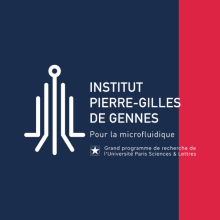As part of its strategy to support scientific excellence, Université PSL launched a Call for Expressions of Interest (AMI) aimed at its researchers, with the goal of fostering new research dynamics following the conclusion of the IRIS projects and in anticipation of the end of the LabEx initiatives in 2024. Through this process, 14 major research programs were selected.
Three of these programmes are managed by the ESPCI Paris - PSL, reflecting the diversity and excellence of its research at the intersection of multiple disciplines :
– IPGG (Institut Pierre-Gilles de Gennes), co-sponsored by ESPCI, Institut Curie and ENS, is developing interdisciplinary research centred on micro- and nanofluidics to meet major challenges in biology, health, green chemistry and the energy transition, by federating a large network of teams within PSL.
– Metasoft Matter, co-sponsored by ESPCI explores new frontiers in soft matter by combining expertise in flexible materials, metamaterials, robotics, and complex fluids, with a particular focus on environmental challenges and technological innovation.
– Smart Waves, co-sponsored by ESPCI unites scientific communities around the concept of smart waves (optics, acoustics, seismology, etc.) to design new approaches to imaging, communication, agile materials, and wave propagation in complex media.
Together, these three programs reflect ESPCI’s commitment to advancing breakthrough research, fostering interdisciplinary collaboration, and contributing concrete scientific solutions to the major challenges of our time.
The ESPCI is also involved in these six major programs within the PSL University :
– Chemistry of Cell states, which aims to decipher the molecular mechanisms of cell plasticity,
– ChemAI, part of the data science and artificial intelligence revolution in chemistry,
– ENLife, to understand and design synthetic living systems at different levels of complexity,
– Faire Collection, which seeks to federate and encourage PSL research on collections.
– Quantum Matter, which brings together teams active in the field of quantum matter,
– Mechanisms of Learning & Adaptation, which aims to reveal the biological underpinnings that govern the brain’s learning and adaptation functions.
 Click here to find out more ↗ |
 Click here to find out more ↗ |
 Click here to find out more ↗ |




